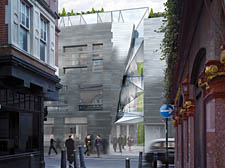| |

Ceramic vision – artist’s impressions of the development |
Dreams of new-look Soho stir developers
Success for modern design seen as breakthrough
PROPERTY developers are rubbing their hands with glee after planning chiefs approved the demolition of a historic and listed police station in Soho.
The former section house at 40 Beak Street will be transformed into a five-storey glass office and homes complex.
The decision, one of the first modern designs to achieve approval in Soho since Richard Rogers’ Broadwick Street development in 1996, is being interpreted as a major breakthrough, allaying fears that the inauguration of London’s new mayor, Boris Johnson, known as an opponent to changing the facade of historic London, would spell doom for developments of this kind.
Deborah Saunt, director of architects DSDHA that has worked with ceramic artist Edmund De Waal to produce the designs, said: “When they saw it at officer level they thought it would never get through planning. But it went though with incredible compliments.”
Westminster City Council’s role in wider planning policy has recently become more evident with the appointment of leader Sir Simon Milton as the mayor’s senior planning adviser last month.
Ms Saunt added: “Westminster is a Tory borough. It suggests [Boris Johnson] is not going to ignore good design. Westminster said it wanted contemporary design, and this is the first test of whether they will be true to their word.”
Entirely clad in shimmering silver ceramic tiles, the 20,000 sq ft building was described by planners as “a striking modern design”.
Architects DSDHA describe the building as a “gift to the street”, making reference to Beak Street’s former name of Silver Street, the ancient thoroughfare connected the old highways of Oxford Street and Piccadilly.
It has recently been revealed that Shakespeare rented a room there for around four years, writing his problem plays Measure for Measure and All’s Well That Ends Well.
Queen Anne’s messenger Thomas Beake acquired a plot of land on the street in 1680, and it was later renamed after him. Beake succeeded as a land developer after the Great Fire of 1666.
Work is expected to start on site in early 2009.
The council’s chairman of the planning and sub-development committee, Councillor Alastair Moss said: “This is an incredibly exciting development with a bold, contemporary sustainable design which will enhance the Soho Conservation Area. The planning committee was highly impressed with the quality of architecture and in the circumstances, although the existing building did have some merit, we felt this new development would be a stunning addition to the rich mixture of architecture in this part of the city.
“Soho is a vibrant residential community, as well as an important business and entertainment district, and these proposals will provide high quality accommodation which will enhance these qualities. The proposed lighting scheme will also enhance the appearance of the building at night, helping to make Beak Street and Bridle Lane look more attractive.” |
 |
|
| |
| |